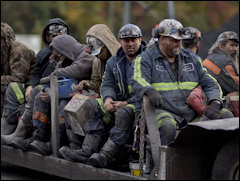The U.S. coal industry is in collapse. Market forces in the form of cheap, abundant natural gas have put coal at a huge competitive disadvantage while environmental initiatives have gutted demand by compelling the shutdown of coal-fired power plants not worth retrofitting with scrubbers. Earlier this week Peabody Energy, the largest coal producer in the country, announced that it would seek bankruptcy protection. Only one company in the Dow Jones Coal Index, Consol Energy, has avoided that fate.
Writing in Slate Magazine, Daniel Gross poses an interesting question:
When companies file for bankruptcy, the fact that they can’t meet their obligations to creditors like banks or bondholders isn’t that much of an issue. They can absorb the loss and wind up with ownership of the company. But bankrupt coal firms will have a hard time meeting their obligations to the environment, to employees, and to retirees. Which means they will either need a bailout or they will suffer further obloquy when they walk away from commitments.
Coal mining in Central Appalachia is an immensely destructive business, especially strip mining and mountaintop removal, which quite literally moves mountains, alters drainage flows, and releases potentially toxic elements into the water. Federal regulations require coal companies to stabilize the land in order to reduce environmental hazards. When coal was booming a few years ago, that wasn’t a problem. With major coal companies going bankrupt, there are growing questions whether coal companies can fulfill their obligations.
Virginia-based Alpha Natural Resources has $640 million in self-guaranteed liabilities in reclamation costs, reports the Washington Post. Will a western Virginia bankruptcy court judge honor the debts of creditors and suppliers or obligations to the public?
Meanwhile, coal industry pension funds, which have always been shaky, now are in deep doo-doo. The United Mine Workers of America’s 1974 pension plan was said last year to be $2 billion under-funded. The plan asked for participating unionized companies to increase their contribution by 10% to $6.05 per union employee per hour worked, along with benefit cuts for future employees. But it is questionable how long bankrupt coal companies can sustain such payments. Who, if anyone, will make good promises made to retired coal miners?
Bacon’s bottom line. Coal is a dirty, unsafe fuel, and most of us won’t miss it. But the transition to a clean-energy economy will be messy. For Virginia’s coalfield region, the demise of the coal industry doesn’t mean just the loss of jobs, as debilitating as that will be. It could well mean environmental clean-ups never completed and pensions never paid.



